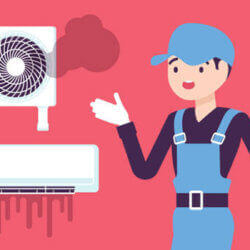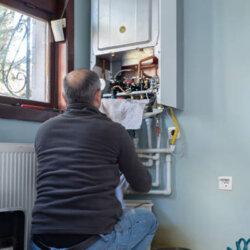
For most homeowners, a major concern during winters is the sky-high heating bills they will have to pay for their homes. It is natural to be worried. But now is the time to stop worrying and start acting if you wish to lower your heating bill this winter. There are a few common reasons why your home heating bill is always high. Read on to learn more about all of the reasons that may be increasing your heating bill.
It is also important to note that regular furnace maintenance could often be an easy solution to the problem. To learn more and schedule an appointment for furnace repair or maintenance in St. Louis, call us at 314-993-1110 today.
Common Reasons Why Your Heating Bill May Be Too High
The HVAC system in your home is one of the biggest pieces of equipment that draws maximum power. So it should be no surprise that your furnace or heater can be a major contributor to your energy bills. Here are a few reasons how it may be impacting your high heating bill.
- Clogged air filters: The most common reason why HVAC systems increase your heating bills is that they aren’t operating efficiently. And clogged air filters are one of the major reasons behind inefficiency in an HVAC system. A dirty or clogged air filter reduces the rate of air circulation through the system. This means that the furnace does not get enough air to heat, and so it has to work longer to heat your home to the desired temperature. This results in more energy consumption and, eventually, higher heating bills. This extra strain that a clogged air filter puts on your HVAC system can also reduce its longevity. Check your air filters regularly, and every time an HVAC technician does maintenance work, make sure to get the filter cleaned or replaced.
- Leaks in the ductwork: Leakage of heated air from the ductwork may result in a lot of energy loss. It is important to inspect your ductwork every year to ensure there are no cracks or gaps that could cause the heat to escape. Such losses will need your heating system to work harder, resulting in increased energy consumption and high heating bills. If you suspect problems, get your ductwork checked by a professional HVAC maintenance contractor.
- Blocked air vents: Similar to clogged air filters. Blocked air vents or registers could also put excess stress on your HVAC system, resulting in more energy consumption. Check if your air vents are blocked or if there is anything kept in front of the vents that obstructs the airflow. Keep your air vents clear of any obstructions and clean them often.
- Improper temperature regulation: Another common reason for high heating bills is that users don’t use the thermostat judiciously. We like to come home to a nice warm atmosphere in the winters. This is why many of us don’t turn the temperature on the thermostat down when we are not home. This is nothing but waste of energy which is unnecessarily increasing your energy bill. Make it a point to set your thermostat a few degrees lower when you are leaving home. A programmable thermostat can make this even more economical by adjusting the temperature automatically depending on how you set it.
- Old furnace: An old furnace may also suck a lot of energy, causing your energy bills to increase. Older furnaces are less efficient and often run into problems. If your furnace is older than 15 years, it is best to replace it.
- Irregular HVAC maintenance: Regular HVAC maintenance and servicing are essential for your HVAC system to run efficiently. If you have not been paying much attention to HVAC maintenance, it is possible that your air filters have become dirty, ductwork and vents are clogged, and the furnace is not giving an optimum output. With regular maintenance, though, all of these problems can be avoided, reducing your energy consumption.
Hire a Trusted HVAC Contractor

For regular HVAC servicing and to keep your energy bills within control, you need to hire a reliable HVAC company. Galmiche & Sons has been in the HVAC maintenance and repairs business since 1950, serving residential and commercial clients throughout St. Louis. Talk to our heating and air conditioning experts to learn more about our services and how we can help.









